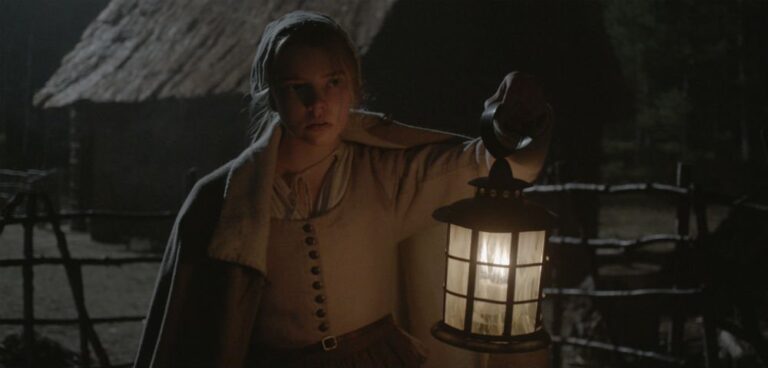A decidedly old-fashioned yarn about a Puritan family trying to survive in the wilderness of 1600s New England, The Witch feels like the antithesis of modern horror cinema. While Hollywood continues to churn out found footage offerings full of cheap scares and paper-thin characters, writer/director Robert Eggers – in his feature debut – serves up a captivating, atmospheric tale that genuinely terrifies.
Exiled after a disagreement with the village elders, William (Ralph Ineson) and Katherine (Kate Dickie) relocate to a small patch of land at the edge of a vast forest, vowing to sustain their family without help from the community. As the eldest child, Thomasin (Anya Taylor-Joy) is not only responsible for the bulk of the chores, but also for keeping an eye on her unruly twin siblings Jonas (Lucas Dawson) and Mercy (Ellie Grainger), while Caleb (Harvey Scrimshaw) accompanies their father on hunting trips and Katherine cares for the newest child, Samuel.

At first, the family’s outlook is optimistic, with hope that their rigorous devotion to God will be rewarded with prosperity. But the tranquility of their simple existence is shattered as strange events begin to occur: crops die on the vine, Samuel disappears during a game of peek-a-boo, and the twins claim to be communicating and trading secrets with the family goat, Black Philip. When Caleb encounters a mysterious figure while wandering alone through the woods, he sets off a chain of events that not only threatens to unravel the family’s faith, but their very sanity.
There’s not a single subpar performance to be found in The Witch, but Taylor-Joy deserves special recognition for carrying the bulk of the film on her shoulders. Most of the narrative is experienced from her point of view, and her bewitching presence – no pun intended – keeps the audience glued to the screen. Much like Alicia Vikander in last year’s stellar sci-fi drama Ex Machina, this could be the sort of breakout role that leads to much bigger things for the talented young actress.
But no matter how talented the cast might be, the film still couldn’t succeed without the right material, and that’s where The Witch truly shines. The film’s deliberately slow pace is never a hindrance, allowing each scene ample time to breathe and unfold naturally, and the period-accurate dialogue – most of which has been crafted using actual court records and other documents from the era – lends an extra air of authenticity that is sorely lacking from many other genre entries.

The Witch isn’t the sort of film that will have audiences shrieking when a character bursts into the frame, accompanied by a loud noise and a flourish of music. Eggers is aiming for something much loftier – he wants The Witch to work its way under your skin until you can no longer escape. He wants the sound of a certain character’s voice to send a shiver up your spine whenever you recall it, or the haunting images to play through your mind as you try to fall asleep at night. Eggers doesn’t just want to momentarily startle his audience, he wants to legitimately frighten them – and The Witch accomplishes that goal in a way that most horror films only dream about.
A captivating and atmospheric tale of a Puritan family dealing with strange occurrences in 1600s New England, The Witch isn't content to merely startle its audience - it wants to genuinely terrify them, and the haunting imagery and note-perfect performances ensure that it succeeds.
-
Score9

